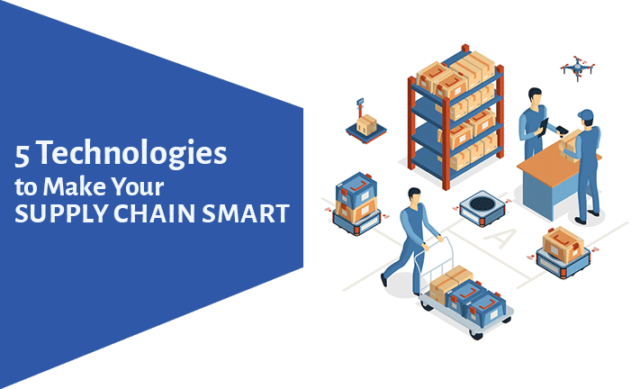A survey by Gartner reveals that over 60 percent of supply chain leaders take technology with all the seriousness that it deserves, believing it to be a major source of competitive advantage. This should not spring a surprise since the combination of innovative technologies with digitization has immensely helped organizations transform their logistics workflows, through better operational efficiency, which in turn results in customer loyalty and better ROI.
However, there is a distinctive advantage between how organizations make use of technology with respect to their supply chain management. There are supply chain companies that leverage technology to optimize specific logistics aspects, while there are others that adopt technology to the full for a comprehensive supply chain transformation. This daring approach often makes them stand out in the crowd.
Companies belonging to the second category go for smart supply chains – one of the most ground-breaking concepts in logistics software development, which make use of state-of-the-art technology like Internet of things, artificial intelligence, and blockchain – technology to achieve cutting-edge logistics workflow automation.
In the following paragraphs, we shall look at five essential technologies, which form the backbone of a smarter supply chain. We shall also see how a good logistics software development company can provide organizations the flexibility and adaptability to constantly evolve and improve to efficiently meet the ever-changing customer needs.
Internet of things
The implementation of IoT plays an important role in streamlining supply chain operations, and there are a variety of reasons for this. First, the Internet of things allows organizations to track their fleet in real-time from remote locations.
This helps in a variety of ways ranging from helping logistics specialists determine the fleet that needs maintenance to choose the best possible route for quick delivery. Second, IoT sensors can keep a track of the humidity, temperature, and moisture of cargo and help make adjustments accordingly. This is absolutely important for perishable cargo like milk and vegetables, or for items like flowers that can quickly wilt in absence of requisite temperature. This ensures that the customers receive their goods in perfect condition.
Adopt Cloud computing
In general, a smooth supply chain management is sum total of seamless data exchange between multiple sources. As such, a slow or inefficient data transfer and exchange mechanism can render the entire system ineffective. To eliminate any such possibility, it is best to establish a reliable digital environment, and to accomplish this cloud computing is a perfect choice. Organizations can take the help of cloud computing to foster real-time data collaboration, better team coordination, and enhanced data security.
Artificial intelligence
It is a known fact that a smart supply chain generates a mammoth amount of data. This huge amount of data when analyzed properly can offer a lot of help when it comes to demand forecasting. amounts of data that can be used in demand forecasting, and this is where AI makes its presence strongly felt.
AI absolves demand forecasting experts of the tedious and time-consuming task of spending hours manually analyzing data generated by different parts of the supply chain. An AI-based software can process all the data in a jiffy thus allowing experts to quick and prudent decisions with respect to resource allocation.
In fact, experts opine that AI in conjunction with IoT can bring even more important benefits in supply chain management. IoT sensors gather data, and this can be analyzed by AI to offer route and delivery optimization recommendations.
Blockchain
If you have been following banking, investing, or cryptocurrency over the last 10 years, you may be familiar with “blockchain,” the record-keeping technology behind bitcoin. At its most basic level, we are actually talking about digital information (the “block”) stored in a public database (the “chain”).
Price Waterhouse Coopers (PWC) defined blockchain as a ‘distributed, decentralized transaction ledger.’ A record of transactions is maintained across several computers that are linked in a peer-to-peer network.
Integration of blockchain technology in the supply chain can significantly enhance its transparency. This is possible as blockchain provides an unassailable ledger for storing data obtained from a variety of sources. This allows different supply chain members, to view accurate data about the goods’ status and location. A blockchain also speeds up the transaction process through the utilization of smart contracts.
Supply control towers
Apart from making use of cloud computing, organizations can build supply control towers to streamline data management through better analysis and connectivity, which in turn can help in the seamless transformation of the supply chain into a smart supply chain.
Conclusion
Ever-increasing customer expectations, changing regulatory requirements, and fear of supply chain disruptions is compelling more and more organizations to adopt an innovative approach to improve their logistics operation. A good software development company can help integrate all the above-mentioned five technologies to establish more transparent and efficient smart supply chains.









